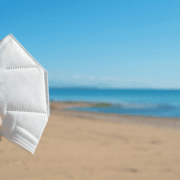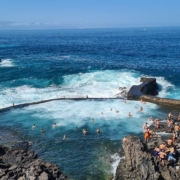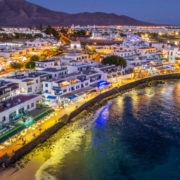The Canary Islands’ probable entry into Phase 2 of the government’s lockdown exit plan on Monday will bring an end to the two time slots destined for children and for adults taking exercise. The 10-12 am and 7-8pm time slots for the over-70s will remain in place, however.
This means that, apart from the over-70s time slots, children will be able to leave the house for longer than an hour at any time of day; while adults under 70 can also walk, run or cycle whenever they want outside those hours.
The time slots have been increasing irrelevant since last week’s entry into Phase 1, since when people have been able to walk and take their children anywhere on the island as long as they were visiting friends, doing some shopping or having a coffee.
Nevertheless, the most vulnerable members of society are still deemed to require some protection, meaning their time slots will not be abolished just yet.
Mask up for the beach?
Canarian health minster Julio Pérez has stated that mask use is likely to be compulsory on beaches when they reopen on Monday, as it is in all public spaces.
The rules governing beaches will be published tomorrow, but Pérez said he understood that the same rules will apply for all public spaces – face masks must be worn when two-metre distancing cannot be observed.
In reality, the rules appear to have been designed for crowded town beaches on mainland Spain . On Lanzarote, it’s usually fairly easy to observe such distancing on most of the island’s large beaches, although smaller ones such as Playa Chica in Puerto del Carmen and Playa Blanca’s town beach may qualify for mask use.
Two cases left on Lanzarote
The discharge of another patient yesterday means that Lanzarote only has two remaining active cases of COVID 19. Both are in the Dr José Molina Orosa hospital, where one remains in intensive care.
The discharged Lanzarote patient was one of 33 full recoveries on the Canaries yesterday, bringing the total of those who have recovered from the virus to 1,685 of the 2,312 patients who have tested positive.
Of the remaining 627, 155 have died of the disease and 472 remain active cases, 418 of whom are quarantined at home and 54 hospitalised (14 in intensive care.)
The figures mean that 6.7% of those who tested positive for the virus on the Canaries have died of it, while 73% have recovered from it. However, it is likely that many more people have suffered from the disease and recovered without knowing about it – up to 33% of cases may be asymptomatic, according to recent research.
The Canaries has now not registered a death since Monday. These figures, and the decrease of pressure on the health services that they entail, bode well for the Canaries admission into Phase 2 of the government’s lockdown exit plan on Monday.









